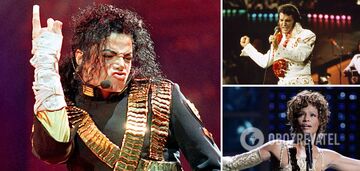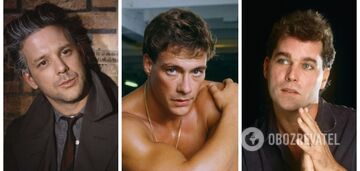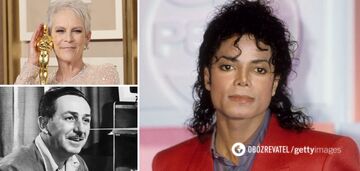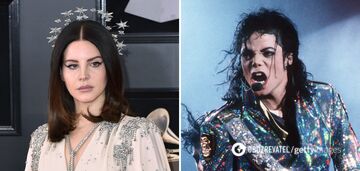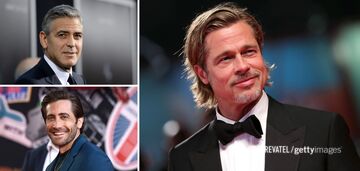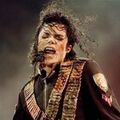
Michael Jackson
Michael Joseph Jackson was born on August 29, 1958, in Gary, Indiana. The head of a large family, Joe, was a pretty good blues guitarist, and all the children owed their musical talents to him. As early as age six, Michael was singing and dancing beautifully.
"My mother pointed out that Michael was different from birth," Michael's sister La Toya writes in her book. - He started walking and talking early and was remarkably agile. His mother never bragged about children, but she made an exception for Michael: "I won't say he's a child prodigy, but there's something special about him.
Michael was a bundle of energy, with a radiant look and mischievous smile. He has never tried to boss others around, but he is a natural born instigator.
Every morning before school, the neighborhood kids would gather in front of our house and wait for Michael to announce the game everyone was playing today. Everything revolved around Michael, and in his own little world, he was already a celebrity at the time.
Even then, Michael had a clear idea of what a show and presentation was all about. When we were taking pictures, he, a six-year-old toddler, would command in his thin voice, "Okay, Jackie, you get over there, and Jermaine gets next to you!" No detail escaped his attention. His mother always had him pick out costumes for the stage. Purple colored suit or black pants with white shirts? The youngest of the five would choose, "That one!" - and he was always right. Temperamentally and with dignity, Michael, the only one of us, defended himself against his father...
...Around 1965, the brothers, under the name Five Jackson, entered a talent contest organized by Roosevelt High School around the corner of our house. I can still see them dancing and singing on stage to the tune of the then fashionable hit "My Girl. Our whole family was surprised and delighted when the brothers won the contest, where they were younger than all the other contestants...
The audience excitedly threw money at the boys. They hid it, but then had to give it to Joseph. From the proceeds, Joseph would distribute funds for pocket money. Jackie, Tito, Germaine, and Marlon quickly spent their money or hid it. Michael invested his share in candy, which he sold to the neighborhood children. His mother often noticed that even in children's games and actions, he showed himself to be an adult. With his "candy store," he brought joy to other children and made money at the same time.
The next three years, the boys performed five times a night. Their repertoire included songs from the hit parade, such as "Who Loves You" and "Tobacco Way. Usually the performances were close to home, but sometimes they played in Phoenix, Kansas City, Washington, D.C., and Philadelphia. And Mom, Randy, Jennet, and I waved goodbye to them. She and my father would load food bags into the car as they left for another concert. I sometimes cried, because I began to miss, already saying goodbye to them.
In 1970, on Motown, Michael recorded his first solo ballad, "Got to Be There," which topped the charts not only in the U.S., but also in Europe. In 1972 he released his first single "Ben" to the music of American composer W. Scharf, and an updated "Rockin Robin" also topped the American charts.
Michael immediately attracted attention with his incredible dance technique. It seemed to the audience that the man in front of them had no bones, who at the same moment could move in different directions.
Michael's solo career was quickly gaining ground, but he continued to perform with his brothers until 1976. The pivotal year for Jackson was 1978, when the movie "The Wizard" was filmed - a kind of variation of the plot of "The Wizard of Oz" Baum. It was then that Michael met producer and composer Quincy Jones. The result of their work together was Jackson's first album, Down from the Wall (1979), which sold 19 million copies. Four of its hits ranked in the top ten, and one of its singles won a Grammy Award.
Jackson's next album was Thriller (1982). "'With Thriller,' he proved that music can overcome prejudice," writes La Toya Jackson. - He once said, "I'm going to get people all over the world to recognize me and say, 'I love Michael Jackson and his music, and what color his skin is, it doesn't matter.
With the remarkable "Billie Jean" and "Hit it!" videos he managed to break through the invisible barrier that separated musicians of color from the American music video world. He paved the way for an entire generation of capable Negro performers to enter the nascent music video genre.
Biographers have ranked Michael's performance with "Billie Jean" on Motown Records' 25th anniversary show as a landmark event in music history. In his black, gold-embroidered jacket (which I had once bought for my mother), Michael danced on stage to "A Walk in the Moonlight," which he had written, and thrilled the audience indescribably. He returned home at night in a state of euphoria - he bombarded us with stories, they gushed out of him: who had said what at the concert, who had clashed with whom, and who had clawed at whose hair. Especially the verbal duel between Diana Ross and Mary Wilson was reported in great detail.
Two songs from "Thriller" topped the most representative charts. Five songs made the top 10: "Thriller," "When I Start Something," "Human Soul," "Pretty Boy" and the Paul McCartney collaboration "My Girlfriend."
"Thriller" broke all existing records for the number of copies sold and holds the lead to this day. By the turn of the century, the album had sold 46 million copies; it won seven Grammy awards. It included hits in abundance, each supported by a music video, pushing the boundaries of the genre. The videos, which showcased his extraordinary skills not only as a singer, but also as a dancer, brought him unheard of popularity and created a whole new level of perception - he seemed like some kind of magical being, having nothing to do with the prose of life around him.
Jackson maintains an entire staff that specifically invents tricks for him; many he invents himself as well. All of this requires a high degree of technical equipment. It is said that three pounds of pyrotechnics, three lasers, and 225 sound tracks are used for one Jackson concert alone. Transportation service includes 160 people, and sometimes that number increases. Fifty-seven trucks transport the equipment during the tour. In addition, special ballet, musicians, and stage workers are involved in the performances. The singer's popularity is growing, and the media are showing increasing interest in his personal life. On the pages of newspapers and magazines he appeared as an eternal child, surrounded by toys and pets, completely isolated from real life. This artificially created image was reinforced when Michael released an album based on S. Spielberg's sci-fi movie "Alien" (1982).
Since 1983, Michael has been sponsored by Pepsi-Cola. This support contributed greatly to the fact that in 1984 the concerts with the popular singer sold a record number of tickets in the history of pop music. Michael becomes an almost unavailable superstar, and interest in him is steadily growing. In 1985, the singer released his "African" single "We are the World", which immediately became an international hit.
By that time his fortune was so great that he did not hesitate to give $47.5 million to the "ATV music company" for John Lennon and Paul McCartney records.
In 1987, Jackson records the album "Bad," which sold 22 million copies. The next one, "Dangerous", appeared in 1992; it was the longest in time, at 76 minutes. Here the singer tried to change the style and sing in the rhythms of techno-pop.
In 1994 Jackson married the daughter of the King of Rock and Roll, Elvis Presley, Liza Maria. Liza-Maria assured that she had liked Michael ever since she first saw him at a Jackson Five concert. Judge Hugo Alvarez, who registered the marriage, said the following about Mrs. Presley: "You can't imagine how she looked at him. There was love in her eyes, a long and endless love.
Many people tend to think of marriage as one of the publicity stunts of a famous singer, who thus wants to raise his popularity. Be that as it may, the marriage was unsuccessful and broke up after two years.
More successful was Michael's second marriage. In late 1996, Jackson entered into a new marriage with Debbie Rowe. In the next two years, the couple gave birth to two children, a son Prince Michael Jackson Jr. and a daughter Paris Michael Catherine Jackson. In late 1999, however, Michael and Debbie's marriage broke up. In 2001, Michael Jackson's name was inducted into the Rock and Roll Hall of Fame, and in September, the singer celebrated the thirtieth anniversary of his artistic career by performing on stage again with the members of the Jackson Five.
In 1996 Jackson released his next album, The Story; it sold 14 million copies. It probably could have been more, if not for the loud scandal: Jackson was accused of seducing teenagers. The singer himself categorically denied everything, and to maintain interest in his work, spent several million to shoot promotional videos and a video clip for the album.
Today Jackson almost always appears in public wearing a hat. At one time doctors changed the singer's skin color, and now Michael has vitiligo disease, which eats pigments in the body and negatively affects the appearance of the singer. British medical professionals at Bradford University hope to stop the appearance of white spots on Jackson's skin. They have found a drug that will help Michael Jackson stop the development of the disease. Despite numerous "whitening" operations, the pop star does not want to turn into an albino and intends to defeat the disease with a new medicine.
In July 2002, the newspapers wrote about Jackson's protest: he spoke out against discrimination by record companies against black performers. He called the executives of these companies "racists" and "devils."
"Generations of black musicians have been manipulated by show business sharks," Jackson told a news conference.
To give an example, the singer cited the story of his latest CD, "Invisible" - recorded and distributed by the Sony Corporation. It was sold only 2 million copies in 28 weeks, according to Jackson's version, because the company did not fulfill its advertising obligations, which is the fault of the head of corporation T. Mottola, with his prejudiced attitude towards ethnic minorities.
Or maybe it's simpler than that? In any case, the representatives of Sony think otherwise: "If anyone is to blame for the disc's failure, it's Jackson himself.
Yes, every year it becomes more and more difficult for Jackson to confirm his title of a world superstar.



